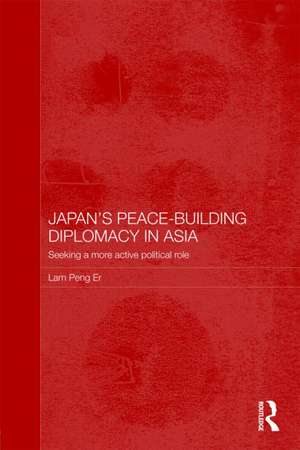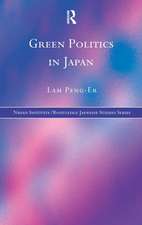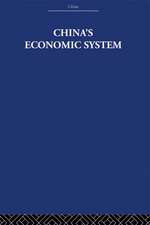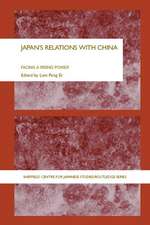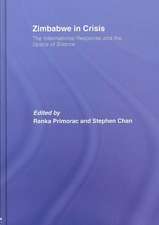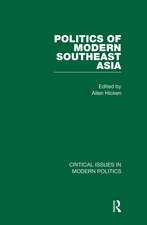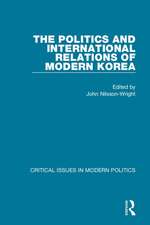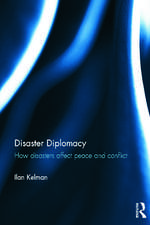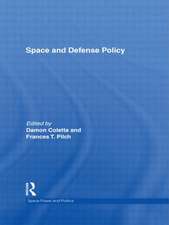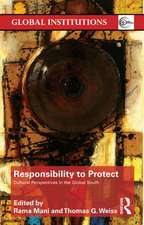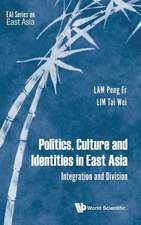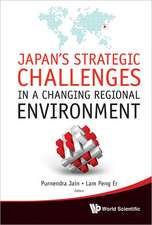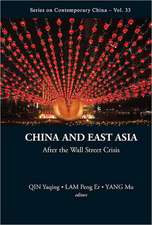Japan's Peace-Building Diplomacy in Asia: Seeking a More Active Political Role: Routledge Security in Asia Pacific Series
Autor Peng Er Lamen Limba Engleză Paperback – 21 oct 2011
| Toate formatele și edițiile | Preț | Express |
|---|---|---|
| Paperback (1) | 485.32 lei 6-8 săpt. | |
| Taylor & Francis – 21 oct 2011 | 485.32 lei 6-8 săpt. | |
| Hardback (1) | 1057.05 lei 6-8 săpt. | |
| Taylor & Francis – 26 mai 2009 | 1057.05 lei 6-8 săpt. |
Din seria Routledge Security in Asia Pacific Series
-
 Preț: 326.36 lei
Preț: 326.36 lei - 18%
 Preț: 1165.73 lei
Preț: 1165.73 lei -
 Preț: 387.49 lei
Preț: 387.49 lei - 26%
 Preț: 821.87 lei
Preț: 821.87 lei -
 Preț: 390.37 lei
Preț: 390.37 lei -
 Preț: 411.85 lei
Preț: 411.85 lei -
 Preț: 466.29 lei
Preț: 466.29 lei - 18%
 Preț: 1167.71 lei
Preț: 1167.71 lei -
 Preț: 132.04 lei
Preț: 132.04 lei - 18%
 Preț: 1002.99 lei
Preț: 1002.99 lei -
 Preț: 261.75 lei
Preț: 261.75 lei -
 Preț: 476.60 lei
Preț: 476.60 lei - 12%
 Preț: 325.34 lei
Preț: 325.34 lei -
 Preț: 412.74 lei
Preț: 412.74 lei -
 Preț: 491.26 lei
Preț: 491.26 lei - 17%
 Preț: 271.61 lei
Preț: 271.61 lei - 18%
 Preț: 736.24 lei
Preț: 736.24 lei -
 Preț: 260.07 lei
Preț: 260.07 lei -
 Preț: 282.69 lei
Preț: 282.69 lei - 18%
 Preț: 1053.92 lei
Preț: 1053.92 lei -
 Preț: 484.47 lei
Preț: 484.47 lei -
 Preț: 467.44 lei
Preț: 467.44 lei -
 Preț: 463.58 lei
Preț: 463.58 lei -
 Preț: 471.25 lei
Preț: 471.25 lei - 18%
 Preț: 1227.03 lei
Preț: 1227.03 lei -
 Preț: 450.03 lei
Preț: 450.03 lei -
 Preț: 316.83 lei
Preț: 316.83 lei -
 Preț: 343.91 lei
Preț: 343.91 lei -
 Preț: 389.66 lei
Preț: 389.66 lei - 18%
 Preț: 1002.63 lei
Preț: 1002.63 lei - 43%
 Preț: 214.23 lei
Preț: 214.23 lei - 18%
 Preț: 1162.84 lei
Preț: 1162.84 lei - 18%
 Preț: 1060.52 lei
Preț: 1060.52 lei
Preț: 485.32 lei
Nou
Puncte Express: 728
Preț estimativ în valută:
92.87€ • 95.81$ • 77.50£
92.87€ • 95.81$ • 77.50£
Carte tipărită la comandă
Livrare economică 27 martie-10 aprilie
Preluare comenzi: 021 569.72.76
Specificații
ISBN-13: 9780415586900
ISBN-10: 0415586909
Pagini: 184
Dimensiuni: 156 x 234 x 10 mm
Greutate: 0.36 kg
Ediția:1
Editura: Taylor & Francis
Colecția Routledge
Seria Routledge Security in Asia Pacific Series
Locul publicării:Oxford, United Kingdom
ISBN-10: 0415586909
Pagini: 184
Dimensiuni: 156 x 234 x 10 mm
Greutate: 0.36 kg
Ediția:1
Editura: Taylor & Francis
Colecția Routledge
Seria Routledge Security in Asia Pacific Series
Locul publicării:Oxford, United Kingdom
Public țintă
Postgraduate, Professional, and UndergraduateCuprins
Introduction 1. Peace-Building: A New Pillar in Japan’s Foreign Policy 2. Cambodia: Japan’s First Comprehensive Peace-building 3. East Timor: Japan and the Birth of a Nation 4. Japan in Aceh: To End a Civil War 5. Japan in Mindanao: Partnering Malaysia, the Philippines and the Moro Islamic Liberation Front 6. Japan in Sri Lanka: From Ceasefire to a Civil War Resumed 7. Conclusion: Japanese Peace-building and its Future
Recenzii
'Students of all levels in particular will find the book accessible, digestible, and edifying.]...[a welcome contribution to what is turning out to be an excellent series.' - Hugo Dobson, Asian Affairs, March 2010
"Lam’s thoughtful, balanced and well-researched account will be the essential guide to scholars interested in this still-evolving work in progress." - David Martin Jones, Pacific Affairs: Volume 83, No. 4 – December 2010
"This is a must-read book for anyone seeking a comprehensive understanding of Japan's foreign and security policies. It contains surprises even for experts well versed in Japanese foreign policy...In short, Lam brings a bird's-eye view from his perch in Singapore to understanding Japan's relationship with Southeast Asia while using his expertise in Japanese domestic politics to show how this influences foreign policy." - Paul Midford, Journal of Japanese Studies, 37:2 (2011)
"Lam’s thoughtful, balanced and well-researched account will be the essential guide to scholars interested in this still-evolving work in progress." - David Martin Jones, Pacific Affairs: Volume 83, No. 4 – December 2010
"This is a must-read book for anyone seeking a comprehensive understanding of Japan's foreign and security policies. It contains surprises even for experts well versed in Japanese foreign policy...In short, Lam brings a bird's-eye view from his perch in Singapore to understanding Japan's relationship with Southeast Asia while using his expertise in Japanese domestic politics to show how this influences foreign policy." - Paul Midford, Journal of Japanese Studies, 37:2 (2011)
Descriere
This book examines Japan’s foreign policy and its emerging identity as an important participant in conflict prevention and peacebuilding in Southeast and South Asia, demonstrating that Japan has increasingly sought a positive and active political role commensurate with its economic pre-eminence.
